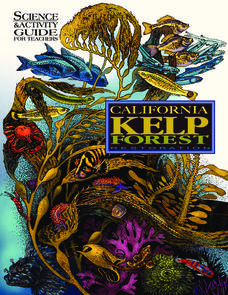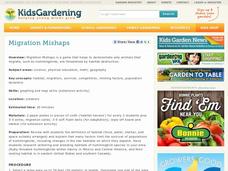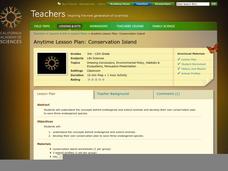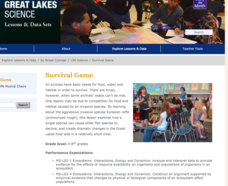NASA
The Case of the Wacky Water Cycle
Join the tree house detectives in learning about the processes of the water cycle, water conservation, water treatment, and water as a limited resource.
Dawn N . Ericson
California Kelp Forest Restoration
This unit is so cool, you won't be able to "kelp" yourself! Intended for all grades, this science and activity guide for teachers offers a unique opportunity to understand kelp's role as a valuable ecological resource. Teachers and...
BBC
Walking with Dinosaurs
Breath new life into your class's study of dinosaurs with this extensive collection of materials. Offering everything from a printable T-rex mask, word searches, and connect-the-dots activities to informational handouts, hands-on...
National Park Service
Living & Non-Living Interactions
What better way to learn about ecosystems than by getting outside and observing them first hand? Accompanying a field trip to a local park or outdoor space, this series of collaborative activities engages children in learning about the...
Wild BC
Is Climate Change Good for Us?
Is it really that big of a deal if the global climate undergoes a little change? Young environmentalists consider this very question as they discuss in small groups the impact of different climate change scenarios on their lives, their...
Sea World
Arctic Animals
Discover the coldest animals in the world with a lesson about the Arctic habitat. Kids use a glossary and information sheet about animals found in the Arctic Circle to complete several activities, including tracking the lemming...
National Gardening Association
Migration Mishaps
Elementary ecologists pretend to be migratory hummingbirds. They fly between wintering and nesting grounds, trying to reach a habitat haven. In a musical-chair fashion, some birds will miss out, and are removed from the game. To further...
California State Parks
Energy Flow Through an Ecosystem
One of the key concepts in life science and biology is the cycling of energy throughout an ecosystem. Learners can take notes on the topic using the vocabulary included within the presentation. From producers making their own food...
University of California
Plankton
Plankton: so much more than just a SpongeBob character. Three different activities have kids looking at both phytoplankton and zooplankton in pictures, as well as collecting their own samples (depending on your access to a saltwater...
Michigan State University
Bug Lyphe!
Introduce ecology classes to biodiversity and interdependence in ecosystems with a PowerPoint presentation. Then, they get up-close and personal with the invertebrate world by collecting insects, classifying them, and graphing their...
Howard Hughes Medical Institute
Icefish Adaptations
What adaptations exist in order for icefish to survive the subfreezing temperatures of the Antarctic Ocean? Middle and high schoolers can find out through watching a related 13-minute video and performing a simple investigation to...
Scholastic
Study Jams! Changes in Ecosystems
Our scholarly friends head to the lake to go fishing and are unpleasantly surprised by the algae filling the water. They talk about primary and secondary succession as different ways that ecosystems are changed. Show the short video,...
University of Kentucky
The Great Spider Debate
Poor, misunderstood spiders! They are feared, disrespected, and detested by many people, yet they do so many positive things. A great addition to any insect unit, learn about some of the more common spiders, while hopefully dispelling...
University of Kentucky
Beneficial Bug Scavenger Hunt
Many people think of bugs as annoying pests to be squashed, but most insects and spiders are beneficial, eating the actual pests or pollinating plants. After reviewing some of the common bugs in your area (they may differ from those...
BioEd Online
Spiders in Space
Does a spider spin its web differently in space? What other ways might microgravity affect an arachnid? Pick a topic to research, plan an investigation, and follow astronauts on the International Space Station as they perform some of the...
BioEd Online
Butterflies in Space
How does gravity affect the life cycle of a butterfly? Learn first-hand what types of investigations astronauts perform in space by following along with one of NASA's experiments. Create butterfly habitats in the classroom with specific...
California Academy of Science
Conservation Island
Why not walk in the footsteps of Teddy Roosevelt and become a conservationist? After discussing issues and reasons for animal extinction, the class creates their own conservation plans. Each small group is given mock data regarding a...
Teach Engineering
Biological Processes: Putting Microbes to Work
Is there such a thing as useful microbes? Get ready to perform experiments on applying microbes for wastewater treatment. The first installment of the three-part unit provides background information to prepare young engineers for two...
Michigan Sea Grant
Invasive Species
Learners identify invasive species to the Great Lakes and analyze their impact on the ecosystem. Using photo cards with pictures and facts, young scientists work in small groups to match invasive species with their corresponding...
Michigan Sea Grant
Survival Game
Musical chairs may be a classic game, but Ruffe Musical Chairs is a unique lesson plan on invasive species! Using the time-honored game, pupils role play the behaviors of the invasive fish called Eurasian ruffe. Learning about this...
Michigan Sea Grant
Food Chains and Webs
Starting with a simple food chain, young scientists interpret the difference and interrelatedness between herbivores, carnivores and producers. They answer questions related to cause and effect of food chain disruptions, including the...






















